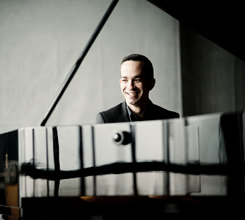The Greensboro Symphony’s April 7 concert consisted of three works offered under the banner of “Heroic Adventures.” The pieces are all known – perhaps better known – in non-musical contexts.
Each called for considerable virtuosity from the performers, and one required the largest number of artists used this season. The back third of the War Memorial Auditorium’s stage was filled with five choral groups from UNCG’s School of Music: the Women’s Choir and the Chamber Singers, prepared by Welborn Young, the University Chorale (William P. Carroll), the Women’s Glee Club (Laura Moore), and the Men’s Glee Club (Eric Poole). All the forces were under the confident baton of Dmitry Sitkovetsky.
Strong characterization by the orchestra’s many fine woodwind players enlivened the purely orchestral version of the “Polovetsian Dances” from Alexander Borodin’s Prince Igor. The well-known opening theme, played by oboist Ashley Barret, was used on Broadway as the melody for “Stranger in Paradise.” Equally vivid performances were given by Anna Lampidis, English horn, flutist Debra Reuter-Pivetta, and clarinetist Kelly Burke. Balances among the strings and winds and brass were fine, and a taut rhythmic drive added to the dramatic effect.
Sitkovetky’s mastery of string technique was everywhere evident in the response of the orchestra to his firmly-controlled and focused interpretation of Richard Strauss’ Also sprach Zarathustra. A “canned” electronic organ was more than adequate, along with the double basses and other low instruments, to sound the rumbling low C that serves to underpin the opening fanfare, by four trumpets. This depiction of dawn through a nature motif was made all too well known when Stanley Kubrick used it in the movie 2001: A Space Odyessy. Growth in confidence and technical skill was evident in the many passages in which the strings are divided instead of playing as whole sections. The orchestral balances were fine, and the ensemble was tight. A listing of solid solo efforts would be long; among the most prominent was Concertmaster John Fadial, in the fifth section, “Of Science.” His warm and expressive line was just one highlight of this movement’s academic fugue.
Prokofiev composed a score to accompany Sergei Eisenstein’s movie Alexander Nevsky. Politics leading to the Hilter-Stalin pact caused to film to be rushed before the composer could fully flesh out the score. He later created a cantata for chorus, contralto soloist and orchestra, the final work on the GSO program. The program book listed the scheduled Russian singer, Evgenia Segenyuk. Her work visa was not processed in time, so inserts in the program listed her substitute, the Bulgarian singer Svetlana Serdar. She made it to Greensboro but became ill. By chance, the NC Symphony was performing the same work the same weekend, but their soloist’s rehearsal and performance schedule precluded her coming to the GSO’s aid. UNCG’s long-time director of choruses, William P. Carroll, found a replacement, Stephanie Foley, a graduate student in the vocal department who had never sung with an orchestra. Choral Director Welborn Young spent about 45 minutes with her on the day of the concert, followed by about a half hour with Sitkovetsky. Opening night “butterflies” were not evident as she sang the mournful song of the sixth movement, “The Field of the Dead.” She had a successful baptism by fire, singing with firm tone and careful phonetic diction. Sitkovetsky’s interpretation was a solid success with tight control of the strongly contrasted sections, such as the famous “Battle on the Ice.” Precise pointicello strings sent chills down my spine as they limned the icy lake of the battle. Intimate and comic moments were well integrated with the sweeping big effects. Principal trumpet Anita Cirba’s brilliant work was much in evidence. The high level of the choral work was amazing – the massed choruses sang with remarkable unity and outstanding diction. Had a suitable transliteration of the Russian text been available, much of the cantata could have been followed closely. Considering that a number of the choir members had just finished three performances of Delibes’ Lakmé and that the University Chorale had just returned from a performance in Florida, this was quite miraculous.











